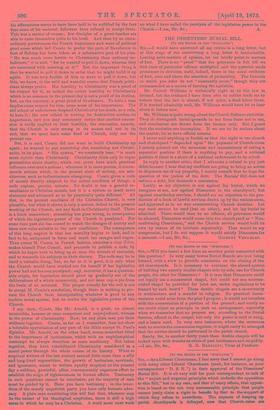THE DISSENTERS' BURIAL BILL.
[To THE EDITOR OF THE "SPECTATOR."] SIR, —I would have answered all -my critics in a long letter, but at this stage of the controversy a long letter is inadmissible. Leaving aside matters of opinion, let me briefly point to matters of fact. There is no "proof " that the grievance is felt till we find cases of particular offence multiplied and the question made prominent in elections, uutil, indeed, there is the usual evidence of fact, over and above the assertion of probability. The funerals to which you refer do not "constantly occur," though they are recommended as a means of fanning the agitation.
Mr. Carvell Williams is technically right as to the law in Ireland, but the evidence I have been able to collect leads me to believe that the law is almost, if not quite, a dead letter there. If it worked admirably well, Mr. 'Williams would have let us hear about it before now.
Mr. Williams is quite wrong about the Church Defence statistics. They do distinguish burial-grounds in use from those not in use, and conclusions are drawn from the former only. But I grant that the statistics are incomplete. If we are to be serious about the matter, let us have official returns.
I never said anything so foolish as that the right to use church and churchyard " depended upon" the payment of Church-rates I merely pointed out the meanness and inconsistency of taking a. separatist position if there is anything to pay, and a national position if there is a share of a national endowment to be seized.
In reply to another critic, that I advocate a refusal to pay just debts because I hear that my creditors are going to bring an action. to dispossess me of my property, I merely remark that he begs the question of the justice of the debt. The Burials' Bill does not enforce a debt, but demands a concession.
Lastly, as my objection is not against lay burial, which we recognise at sea, nor against Dissenters in the churchyard, but against unorthodox services, I should see no objection to the pro- duction of a book of lawful services drawn up by the various sects, and approved as in no way controverting Church doctrine. Let any such service be used (but no other), and let lay burial be- admitted. There would then be no offence, all grievance would, be silenced, Dissenters would come into the churchyard as " Non- conforming Churchmen," and the Church service would hold its- own by reason of its intrinsic superiority. That would be my compromise, but I do not suppose it would satisfy Dissenters for'


































 Previous page
Previous page